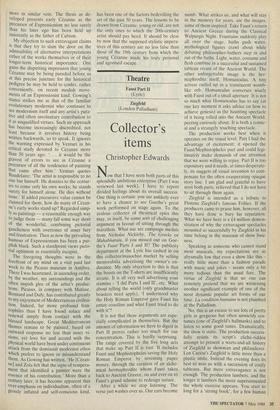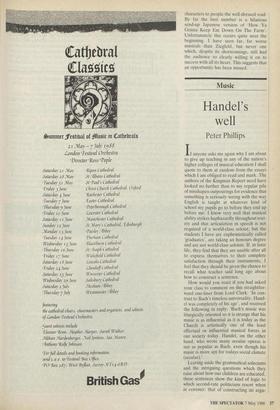Theatre
Faust Part II (Lyric) Ziegfeld (London Palladium)
Collector's items
Christopher Edwards
ow that I have seen both parts of this splendidly ambitious enterprise (Part I was reviewed last week), I have to report divided feelings about its overall success. One thing is certain: you are unlikely ever to have a chance to see Goethe's great work performed on stage again. To the zealous collector of theatrical epics this may, in itself, be some sort of challenging argument in favour of sitting through the marathon. What use are campaign medals from Nicholas Nickleby, The Greeks or Mahabharata, if you missed out on Goe- the's Faust Parts I and II? The publicity department at the Lyric has cashed in on this collector/masochist market by selling memorabilia advertising the owner's en- durance. My only objection to this is that the boasts on the T-shirts are insufficiently arcane. It is all very well advertising your stamina – did Parts I and IF, etc. What about telling the world (only grandmaster
boasters need apply), understood why the Holy Roman Emperor gave Faust his entire coastline and what Faust tried to do with it'?
It is not that these arguments are espe- cially complicated in themselves. But the amount of information we have to digest in Part II proves rather too much for our concentration. This is hardly surprising. The range covered by the five long acts that make up Part II is vast. It includes Faust and Mephistopheles saving the Holy Roman Emperor by inventing paper money, through the creation of an alche- mical hermaphrodite whom Faust takes back to Ancient Greece, on and ever on to Faust's grand scheme to redesign nature. After a While we stop listening. The verse just washes over us. Our ears become
numb. What strikes us, and what will stay in the memory for years, are the images, some of them inspired. Take Faust's return to Ancient Greece during the Classical Walpurgis Night. Fountains suddenly play all over the stage, baths gush water, mythological figures crawl about while debating philosopher-bathers step in and out of the baths. Light, water, costume and flesh combine in a successful and sustained tableau vivant of the Ancient World. The other unforgettable image is the her- maphrodite itself, Homunculus. A tiny actress curled up in a translucent womb- like orb. Homunculus converses wisely with Faust out of a small aperture. It is not so much what Homunculus has to say (at one key moment it asks advice on how to achieve genesis) as the haunting spectacle of it being rolled into the Ancient World, peering curiously about. It is both a comic- al and a strangely touching spectacle.
The production works best when it operates on the visual level. Part I had the advantage of excitement; it opened the Faust/Mephistopheles pact and could legi- timately make demands of our attention that we were willing to repay. Part II is too expository and it needs, at times desperate- ly, its nuggets of visual invention to com- pensate for the often exasperating opaque story line. I am glad and grateful to have seen both parts, relieved that I do not have to sit through them again.
Ziegfeld is intended as a tribute to Florenz Ziegfeld's famous Follies. If the producers came to praise him, however, all they have done is bury his reputation. What we have here is a £4 million demon- stration of why the extravagant spectacles mounted so successfully by Ziegfeld in his time belong in the museum of show busi- ness.
Speaking as someone who cannot stand most musicals, my expectations are so abysmally low that even a show like this – really little more than a fashion parade with music and jokes – seems only a bit more tedious than the usual fare. The virtue of Ziegfeld is that no one can remotely pretend that we are witnessing another significant example of one of the most dynamic popular art forms of our time. La condition humaine is not plumbed at the Palladium.
No, this is an excuse to see lots of pretty girls in gorgeous but often unwieldy cos- tumes (one of Ziegfeld's hallmarks) and to listen to some good tunes. Dramatically, the show is static. The production success- fully resists its script's cliché-ridden attempt to present a warts-and-all history of Ziegfeld as showman and philanderer. Len Cariou's Ziegfeld is little more than a plastic smile. Instead the evening does its best to woo us with a succession of costly tableaux. But mere extravagance is not enough. The production lumbers, and the longer it lumbers the more superannuated the whole exercise appears. You start to long for a 'strong book', for a few human characters to people the well-dressed void. By far the best number is a hilarious send-up Japanese version of 'How Ya Gonna Keep Em Down On The Farm'. Unfortunately this occurs quite near the beginning. I have seen far, far worse musicals than Ziegfeld, but never one which, despite its shortcomings, still had the audience so clearly willing it on to success with all its heart. This suggests that an opportunity has been missed.























































 Previous page
Previous page